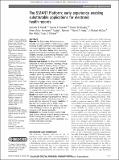The SMART Platform: early experience enabling substitutable applications for electronic health records
Author(s)
Murphy, Shawn N.; Bernstam, Elmer Victor; Kreda, David A.; McCoy, J. Michael; Adida, Ben; Mandl, Kenneth D.; Mandel, Joshua C.; Ramoni, Rachel L.; Kohane, Isaac; ... Show more Show less
DownloadMandl-2012-The SMART Platform_.pdf (594.1Kb)
PUBLISHER_POLICY
Publisher Policy
Article is made available in accordance with the publisher's policy and may be subject to US copyright law. Please refer to the publisher's site for terms of use.
Terms of use
Metadata
Show full item recordAbstract
Objective The Substitutable Medical Applications, Reusable Technologies (SMART) Platforms project seeks to develop a health information technology platform with substitutable applications (apps) constructed around core services. The authors believe this is a promising approach to driving down healthcare costs, supporting standards evolution, accommodating differences in care workflow, fostering competition in the market, and accelerating innovation.
Materials and methods The Office of the National Coordinator for Health Information Technology, through the Strategic Health IT Advanced Research Projects (SHARP) Program, funds the project. The SMART team has focused on enabling the property of substitutability through an app programming interface leveraging web standards, presenting predictable data payloads, and abstracting away many details of enterprise health information technology systems. Containers—health information technology systems, such as electronic health records (EHR), personally controlled health records, and health information exchanges that use the SMART app programming interface or a portion of it—marshal data sources and present data simply, reliably, and consistently to apps.
Results The SMART team has completed the first phase of the project (a) defining an app programming interface, (b) developing containers, and (c) producing a set of charter apps that showcase the system capabilities. A focal point of this phase was the SMART Apps Challenge, publicized by the White House, using http://www.challenge.gov website, and generating 15 app submissions with diverse functionality.
Conclusion Key strategic decisions must be made about the most effective market for further disseminating SMART: existing market-leading EHR vendors, new entrants into the EHR market, or other stakeholders such as health information exchanges.
Date issued
2012-03Department
Harvard University--MIT Division of Health Sciences and TechnologyJournal
Journal of the American Medical Informatics Association
Publisher
BMJ Publishing Group
Citation
Mandl, K. D. et al. “The SMART Platform: Early Experience Enabling Substitutable Applications for Electronic Health Records.” Journal of the American Medical Informatics Association (2012): n. pag. Web. 27 June 2012.
Version: Final published version
ISSN
1067-5027
1527-974X